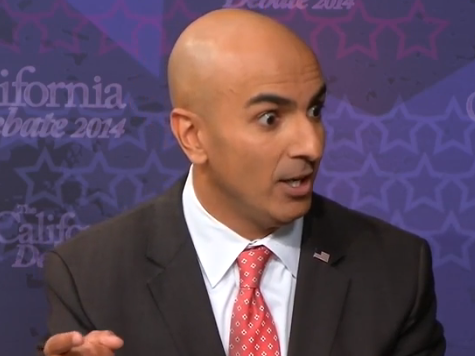SACRAMENTO, California — Republican candidate for governor Neel Kashkari turned in a solid performance in his first–and only–debate with incumbent Democrat Jerry Brown on Thursday evening, shaking off a tough welcome from lead moderator John Myers of KQED and hammering home his arguments against Brown’s policies and in favor of economic reforms that would benefit businesses expansion and job growth in the state.
Myers opened the questioning by asking Kashkari: “How can you win?”
Kashkari declined to take the bait, and pivoted instead to his policy arguments, taking on high-speed rail and blaming Brown’s economic policy for the state’s failure to attract or retain businesses such as Tesla’s new “gigabattery” plant.
Brown, while quick on his feet, was both dismissive and combative, accusing Kashkari of “scare tactics” for his strident criticism.
On the topic of undocumented immigrants, Telemundo’s Dunie Elvir challenged Kashkari to defend his position that unaccompanied alien children who cross the U.S. border illegally, given that the majority of Californians in recent polls supported keeping them in the state. Kashkari defended his views, arguing that the state needed to take care of its own children before those from elsewhere: “Who’s gonna stand up for the kids of California?”
Viewers at home who had not previously seen Kashkari in action would likely have been impressed with his responses, delivered in the close confines of the California Channel studio in Sacramento while the press corps watched from a hotel lobby nearby.
Kashkari truly hit his stride when taking on Brown’s appeal of a court ruling striking down teacher tenure: “You sided with the union bosses. You should be ashamed of yourself, governor.”
Under questioning from Myers, Kashkari gave a more thorough defense of the 2008 federal Wall Street bailout–the Troubled Asset Relief Program (TARP)–than the campaign, and the country, has seen to date.
While the state’s conservative voters will not have been enthusiastic about Kashkari’s arguments for TARP, they might have given him points for dismantling Brown’s populist attack on the program, noting Brown had “raided” it.
Kashkari also gave a less-than-conservative answer to the question of whether he would cancel the state’s Obamacare program: “I would fix it,” he said, before quickly pivoting back to the issue of jobs. “We need a health care plan, in California and nationally, that incentivizes job creation,” he said.
Brown fell back on his record, arguing that the state was “getting it together” and reminding the audience of particular achievements.
The governor stumbled occasionally, as when he defended his program of early prison releases. Kashkari seized on the issue, blaming the releases for horrific crimes committed by some inmates who had been freed.
Brown was clearly less interested in engaging his opponent, while Kashkari rolled out a well-rehearsed attack on point after point, issue after issue, doing his best to maximize his one serious opportunity for statewide media exposure.
For instance, Brown made the case that the state is making “incremental progress,” saying that Kashkari was pushing a false “construct” that if California were “not perfect,” then it was failing. Kashkari replied that it was Brown who was nitpicking, focusing on small issues like plastic bags, dogs in restaurants, and high school football practice rather than necessary reforms to the education system and the state’s economy.
Asked whether California could still build a high-speed rail project without federal funding, Brown insisted that the railroad would be cheaper than building runways and highways, as well as reducing the “carbon footprint” of the state. He then took a cheap shot against Kashkari that fell flat: asked to respond to his opponent’s calling the project the “crazy train,” Brown muttered that Kashkari seemed to prefer the “gravy train” in Washington.
“What a salesman,” Brown later retorted angrily, when Kashkari defended his support for same-sex marriage, in spite of broader Republican opposition. “I guess you learned that at Wall Street, where you sold all that stock.”
Later, a flummoxed Brown repeated the attack on Kashkari’s resume: “You learned your job well at Goldman Sachs,” he said, saying that voting for Kashkari would be like calling upon an “arsonist” to put out a fire.
Kashkari indeed looked polished–not slick, but sincere. Brown, by contrast, looked annoyed and rattled, shrill and frustrated–not like a confident leader enjoying a 16-point cushion in the polls, but like a nervous incumbent facing a close contest.
After Thursday, that might be a bit more likely.
Kashkari did not force Brown to commit any major errors, as he might have hoped. But he gave the state’s electorate a serious alternative.

COMMENTS
Please let us know if you're having issues with commenting.